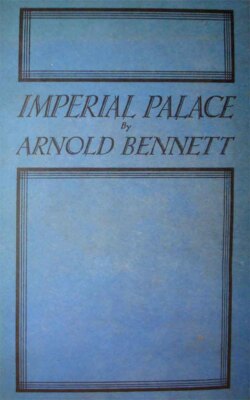Читать книгу Imperial Palace - Arnold Bennett - Страница 28
На сайте Литреса книга снята с продажи.
ОглавлениеII
Two fat men in lounge-suits wandered in. The first word that Evelyn caught in their self-conscious conversation was the word ‘Acceptances.’ He knew and cared absolutely nothing about racing; but he had the wit to gather that Acceptances were one of the few human phenomena capable of making all men kin. The talk among the leaners against the bar suddenly rose to loudness. “And I say that gin is the——” he heard, from an affected and disputatious voice. (He would have liked to hear a profound remark concerning women from some other quarter of the room; but he was disappointed.) He thought: “There was a quality about that wigwam in the Westminster Bridge Road that this place hasn’t got. The free-and-easy! This place is too stiff.” And he began to wonder how the Prince of Wales’s Feathers’ quality could be added to the qualities of the Imperial Palace American bar. “No!” he decided. “Couldn’t be done. Wouldn’t do, either.” But he regretted its absence from the too correct and august atmosphere of the place.
Then a procession moved from the bar in the direction of Evelyn and Sir Henry: an acolyte solemnly bearing a tray upon which were two small glasses, one green, one yellow, followed by the priestly Maddix. Evelyn took the yellow glass, Sir Henry the green. The acolyte bowed and retired. Maddix stood, awaiting in silence the verdict of Sir Henry. Evelyn absurdly wished that Maddix, with rolled-up shirt-sleeves exposing hairy forearms, might have exclaimed freely: “Well, what abaht it, guv’nor?”
Observing that Sir Henry’s eyes were on Evelyn’s glass, not on his own, Maddix allowed himself to remark:
“Mr. Orcham is not much for cocktails.”
“I’m much more for cocktails than you are, Maddix,” Evelyn said. And to Sir Henry: “Maddix is a strict teetotaller.”
“Then how do you manage to invent these things?” asked Sir Henry, gazing now at the green glass.
“I taste. I never swallow.”
Sir Henry both tasted and swallowed, and, putting on the air of a connoisseur, amiably delivered judgment: “Very original. Very good.”
Maddix bowed his gratitude—a bow hardly perceptible; he had divined that to the millionaire all cocktails were more or less the same cocktail. The experience of decades, the inventive imagination of a genuine creator, and some good luck, had gone into the conceiving of the Green Parrot cocktail, and the millionaire recked not, sympathised not, understood not! He had been friendly enough about the human offspring of the cocktail genius, but to the miracles of cocktail art God had decreed that he should be insensible. As a fact Maddix did not know more than ten men in London who truly comprehended the great classical principles of the cocktail. Evelyn was one of the ten.
Sir Henry began to talk to Evelyn. Maddix sedately walked away, the artist sardonic because unappreciated by a barbaric public.
Presently Evelyn glanced at his watch.
“Perhaps we ought to go back to the foyer.”
“Lots of time,” said Sir Henry soothingly.
At that moment the whole room, from the bar to the furthest corner, became agitated with a unique agitation, and every masculine face seemed to be saying: “Strange things have happened, but this is the strangest.” Oblivious of the printed notice prominently displayed at the entrance, a woman was intruding. And not merely a woman, but a young woman, a beautiful woman, proud of bearing, clad in a magnificent frock of mauve and pink, and glinting with jewels. And neither apology nor challenge in her mien. Maddix started instinctively into protest at this desecration; then stopped, thinking: “A greater than me is here. Let him deal with the unparalleled outrage.” And yet the outrage was delicious to every beholding male, even to Maddix himself. The woman went straight to Evelyn and Sir Henry, who both rose quickly. Sir Henry at any rate felt that she must be removed at once. Evelyn did not care whether she was removed or not: in the Palace he was above all laws; the one law was his own approval.
“I got tired of waiting for you in the foyer,” the smiling woman greeted them with entirely unresentful charm. “So I asked where you were.”
The two men were like sixth-form boys convicted of an impropriety.
“Been waiting long?” asked Sir Henry.
“Oh no! Not more than an hour. This place is more old-fashioned than I thought it was.” Such was her indication of awareness that she was where she knew she had no right to be. “I think a public-house would be more up-to-date than this. I know I should adore public-houses. Don’t you adore them, Mr. Orcham?”
“I’m not very well acquainted with public-houses,” said Evelyn.
“Never been in one?”
“Oh yes. Once.”
“How long ago?”
“Oh! Not very long ago.”
Evelyn saw in her something of the woman who at the banked corners of the Brooklands track had many times staked her life on the accuracy of an instantaneous appraisal of positions, speeds and distances. He perceived that she liked his replies. He admired her tremendously. He was dazzled by her. He knew that she knew he was dazzled by her. Sir Henry also was somewhat overset, and quite incapable of reproaching her for the wilful audacity of her invasion. She had put him in the wrong. She triumphantly led out the two men as though they had been captives to an Amazon. She vanished from the view of the room, and to all the seated, entranced males the room seemed to be suddenly darkened.
